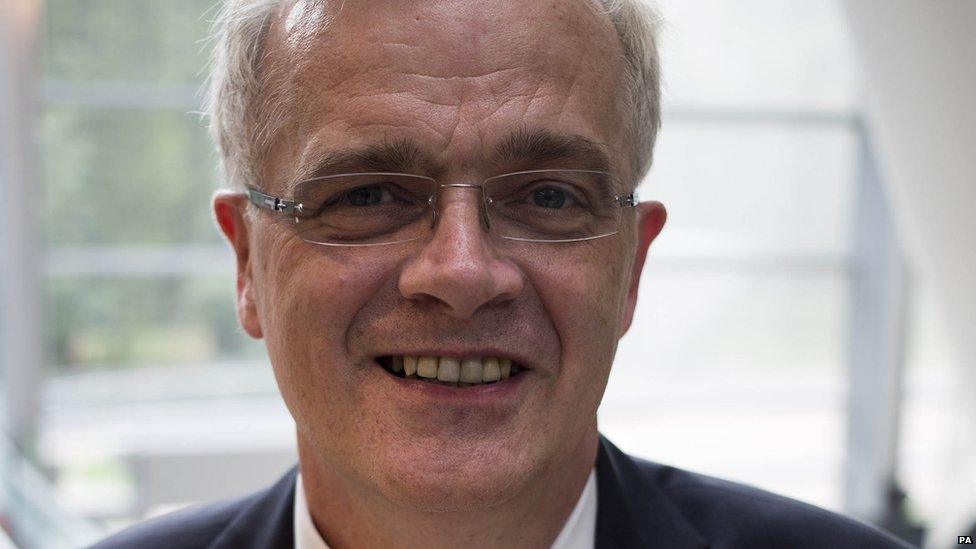Southampton University corrects statement in vice-chancellor pay row
- Published

A university at the heart of a row over its vice-chancellor's £424,000 salary has admitted that he was a member of the committee which decided his pay.
Southampton clarified that Sir Christopher Snowden was a member of its senior salaries committee when his pay was set, but it insists he "was not present" for discussions on it.
On Friday, the university said the vice-chancellor was not a member of the pay-setting committee amid a pay row.
Academics had hit out at his salary.
The University and College Union had highlighted how the vice-chancellor's pay package had risen to £424,000 last year - compared with £352,000 in 2015-16.
The lower level had already drawn criticism from universities minister Jo Johnson, who has hit out at high rates of pay in higher education institutions.
The university explained the extra £72,000 was not a pay rise as such but was because Sir Christopher had only been in post for 10 months during 2015-16.
The higher pay reflected the full year's salary for 2016-17 and the national higher education pay award of 1.1%, it said.
'Error in our statement'
At the same time, the university stressed that Sir Christopher had no role in the remuneration committee which dealt with the issue.
But an academic at the university, who wished to remain anonymous, contacted BBC News with documentary evidence showing the claim to be incorrect.
The university then had to correct its statement after it was contacted by the BBC News website with the publicly available information.
A spokesman for Southampton University said: "There was an error in the wording of our statement sent to you on Friday.
"It should have read that the vice-chancellor's salary was set and regularly reviewed by the university's independently chaired senior salaries committee (now replaced by the university's independently chaired remuneration committee) which reports to the University Council.
"Previously, Sir Christopher *was* a member of the senior salaries committee, but was not present at any point during discussions of or voting on his pay.
"The senior salaries committee was recently replaced by the remuneration committee - a decision agreed by full council in September 2017.
"At the same time, terms of reference for the new committee were agreed, under which the VC is no longer a member - but he is invited back for key discussions for issues not relating to his pay."
'One rule for them'
The unnamed academic got in touch because he said he was angry about the pay level in the context of university tuition fees.
He also said: "The university's '10-Year Plan' includes plans to reduce the salary bill of academic staff, while simultaneously increasing teaching and research quality.
"Most ordinary members of the university consider these two aims to be contradictory and the 10-Year Plan to be corporate nonsense.
"But what we find frankly insulting is that, when it comes to the vice-chancellor's pay, the opposite argument is used: we must apparently pay more to get the best quality.
"One rule for them; a different rule for us."
Sally Hunt, of the University and College Union, said senior pay and how it is set had long blighted the university sector and that its research showed over two-thirds of vice-chancellors sat on the committee that sets their pay.
"While most people would agree this is wrong and looks suspect, it is currently the norm, which makes Southampton's efforts to try and obscure the fact that their vice-chancellor was on the committee that sets his pay package really strange.
"For the university to say the vice-chancellor's pay was set by a committee that didn't even exist when his pay was actually set will fill no one with confidence about its governance structures."
Ministerial criticism
The university drew criticism from Mr Johnson in the summer.
He said in a speech: "There is one institution on the south coast that has seen vice-chancellor pay rise from £227,000 in 2009-10 to £350,000 to 2015-16, which is really quite a sharp increase."
Southampton defended the pay package, saying Sir Christopher was an outstanding leader for the university with much experience in business.
"He is one of the most experienced vice-chancellors in the sector with a track record of delivering long-term exceptional results, and he is a former president of Universities UK."
The row comes a few days after the UK's highest paid vice-chancellor Dame Prof Glynis Breakwell stepped down.
The University of Bath boss had become the focus of criticism for her £468,000 salary.
- Published1 December 2017
